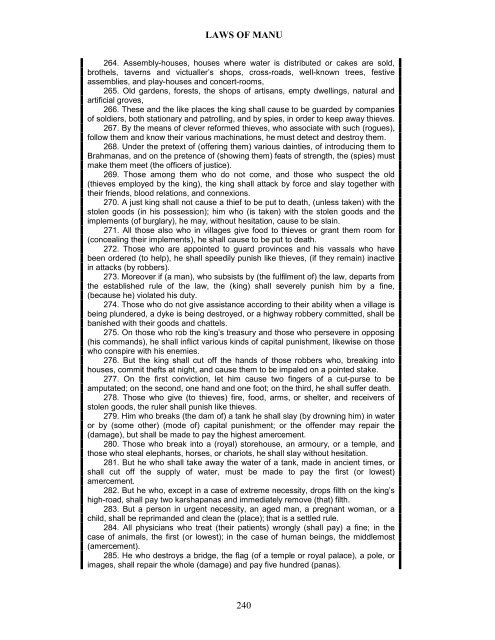You also want an ePaper? Increase the reach of your titles
YUMPU automatically turns print PDFs into web optimized ePapers that Google loves.
LAWS OF MANU<br />
264. Assembly-houses, houses where water is distributed or cakes are sold,<br />
brothels, taverns and victualler’s shops, cross-roads, well-known trees, festive<br />
assemblies, and play-houses and concert-rooms,<br />
265. Old gardens, forests, the shops of artisans, empty dwellings, natural and<br />
artificial groves,<br />
266. These and the like places the king shall cause to be guarded by companies<br />
of soldiers, both stationary and patrolling, and by spies, in order to keep away thieves.<br />
267. By the means of clever reformed thieves, who associate with such (rogues),<br />
follow them and know their various machinations, he must detect and destroy them.<br />
268. Under the pretext of (offering them) various dainties, of introducing them to<br />
Brahmanas, and on the pretence of (showing them) feats of strength, the (spies) must<br />
make them meet (the officers of justice).<br />
269. Those among them who do not come, and those who suspect the old<br />
(thieves employed by the king), the king shall attack by force and slay together with<br />
their friends, blood relations, and connexions.<br />
270. A just king shall not cause a thief to be put to death, (unless taken) with the<br />
stolen goods (in his possession); him who (is taken) with the stolen goods and the<br />
implements (of burglary), he may, without hesitation, cause to be slain.<br />
271. All those also who in villages give food to thieves or grant them room for<br />
(concealing their implements), he shall cause to be put to death.<br />
272. Those who are appointed to guard provinces and his vassals who have<br />
been ordered (to help), he shall speedily punish like thieves, (if they remain) inactive<br />
in attacks (by robbers).<br />
273. Moreover if (a man), who subsists by (the fulfilment of) the law, departs from<br />
the established rule of the law, the (king) shall severely punish him by a fine,<br />
(because he) violated his duty.<br />
274. Those who do not give assistance according to their ability when a village is<br />
being plundered, a dyke is being destroyed, or a highway robbery committed, shall be<br />
banished with their goods and chattels.<br />
275. On those who rob the king’s treasury and those who persevere in opposing<br />
(his commands), he shall inflict various kinds of capital punishment, likewise on those<br />
who conspire with his enemies.<br />
276. But the king shall cut off the hands of those robbers who, breaking into<br />
houses, commit thefts at night, and cause them to be impaled on a pointed stake.<br />
277. On the first conviction, let him cause two fingers of a cut-purse to be<br />
amputated; on the second, one hand and one foot; on the third, he shall suffer death.<br />
278. Those who give (to thieves) fire, food, arms, or shelter, and receivers of<br />
stolen goods, the ruler shall punish like thieves.<br />
279. Him who breaks (the dam of) a tank he shall slay (by drowning him) in water<br />
or by (some other) (mode of) capital punishment; or the offender may repair the<br />
(damage), but shall be made to pay the highest amercement.<br />
280. Those who break into a (royal) storehouse, an armoury, or a temple, and<br />
those who steal elephants, horses, or chariots, he shall slay without hesitation.<br />
281. But he who shall take away the water of a tank, made in ancient times, or<br />
shall cut off the supply of water, must be made to pay the first (or lowest)<br />
amercement.<br />
282. But he who, except in a case of extreme necessity, drops filth on the king’s<br />
high-road, shall pay two karshapanas and immediately remove (that) filth.<br />
283. But a person in urgent necessity, an aged man, a pregnant woman, or a<br />
child, shall be reprimanded and clean the (place); that is a settled rule.<br />
284. All physicians who treat (their patients) wrongly (shall pay) a fine; in the<br />
case of animals, the first (or lowest); in the case of human beings, the middlemost<br />
(amercement).<br />
285. He who destroys a bridge, the flag (of a temple or royal palace), a pole, or<br />
images, shall repair the whole (damage) and pay five hundred (panas).<br />
240


















